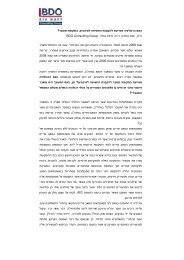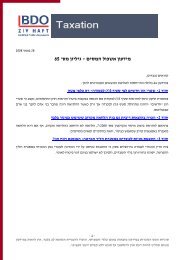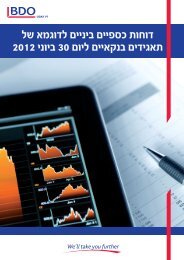preface
preface
preface
Create successful ePaper yourself
Turn your PDF publications into a flip-book with our unique Google optimized e-Paper software.
2. ISRAEL – GENERAL OVERVIEW<br />
2.1. BACKGROUND<br />
Since declaring its independence in 1948, Israel has been the home of Jewish<br />
immigrants from all over the world. The country’s population - composed of<br />
approximately 75.4% Jews, and 24.6% Muslims, Druze, Christians and others -<br />
grew from 870,000 inhabitants in 1948 to over 7.7 million in 2010.<br />
Over the past decade alone, Israel’s population grew by 20.9%. This was partly<br />
due to the massive wave of immigration from the former USSR – following its<br />
breakup at the beginning of the last decade – and partly from Ethiopia.<br />
Immigration in the years 1995 – 2000 stabilized at approximately 70,000<br />
immigrants annually, but this figure has since dropped to 19,000 in 2006,<br />
18,000 in 2007, 14,000 in 2008, 14,500 in 2009 and 16,000 new immigrants in<br />
2010.<br />
Important economic landmarks impacting the development of the modern<br />
Israeli economy were the intensified negotiations in the 1990's with the<br />
neighboring Arab countries, attracting an increasing number of direct and<br />
indirect foreign investors to Israel. This was followed later by the hi-tech<br />
bubble burst at the beginning of the decade and the deterioration of the<br />
geopolitical situation.<br />
In recent years - from 2005 till the eruption of the global financial crisis in<br />
2008 - the Israeli economy enjoyed a high average annual growth rate of 4.9%,<br />
due to the boost in the global economy, economic reforms undertaken by the<br />
Government and improvement in the geopolitical situation.<br />
Although the global economic conditions continue to affect Israel as an open<br />
market exposed to worldwide economic trends, recent data indicates that the<br />
financial crisis has had a relatively moderate impact on the Israeli economy,<br />
compared with other developed countries. This is evident mainly from the<br />
positive growth of the Israeli economy in 2010 (4.5%) and the Bank of Israel’s<br />
growth forecast of 3.9% for this year.<br />
2.2. GOVERNMENT<br />
Israel is a secular democracy whose parliament (Knesset) is elected through<br />
general elections every four years, unless the Knesset or Prime Minister decide<br />
to hold early elections. Under certain circumstances, the Knesset can also serve<br />
for more than four years.<br />
BDO Israel<br />
15

















